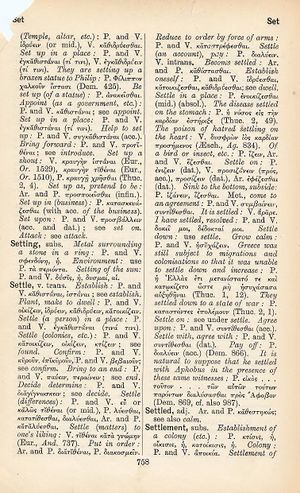settle
English > Greek (Woodhouse)
v. trans.
Establish: P. and V. καθιστάναι, ἱστάναι; see establish.
Plant, make to dwell: P. and V. οἰκίζειν, ἱδρύειν, καθιδρύειν, κατοικίζειν.
Settle (a person) in a place: P. and V. ἐγκαθιστάναι (τινά τινι).
Settle (colonies, etc.): P. and V. κατοικίζειν, οἰκίζειν, κτίζειν; see found.
Confirm: P. and V. κυροῦν. ἐπικυροῦν, P. and V. βεβαιοῦν; see confirm.
Bring to an end: P. and V. παύειν, περαίνειν; see end.
Decide determine: P. and V. διαγιγνώσκειν; see decide.
Settle (differences): P. and V. εὖ or καλῶς τιθέναι (or mid.), P. λύεσθαι, κατατίθεσθαι, διαλύεσθαι, Ar. and P. καταλύεσθαι.
Settle (matters) to one's liking: V. τιθέναι κατὰ γνώμην (Eur., And. 737).
Put in order: Ar. and P. διατιθέναι, P. διακοσμεῖν.
Reduce to order by force of arms: P. and V. κάταστρέφεσθαι.
Settle (an account), pay: P. διαλύειν.
V. intrans. Become settled: Ar. and P. καθίστασθαι.
Establish oneself: P. and V. ἱδρύεσθαι, κατοικίζεσθαι, καθιδρύεσθαι; see dwell.
Settle in a place: P. ἐνοικίζεσθαι (mid.) (absol.).
The disease settled on the stomach: P. ἡ νόσος εἰς τὴν καρδίαν ἐστήριξε (Thuc. 2, 49).
The poison of hatred settling on the heart: V. δυσφρὼν ἰὸς καρδίαν προσήμενος (Aesch., Ag. 834). Of a bird or insect, etc.: P. ἵζειν, Ar. and V. ἕζεσθαι. Settle on . P. ἐνίζειν (dat.), V. προσιζάνειν (πρός, acc.), προσίζειν (dat.), Ar. ἐφέζεσθαι (dat.).
Sink to the bottom, subside: P. ἱζάνειν, ἵζεσθαι.
Met., come to an agreement: P. and V. συμβαίνειν, συντίθεσθαι.
It is settled: V. ἄραρε.
I have settled, resolved: P. and V. δοκεῖ μοι, δέδοκταί μοι.
Settle down: use settle.
Grow calm: P. and V. ἡσυχάζειν.
Greece was still subject to migrations and colonisations so that it was unable to settle down and increase: P. ἡ Ἑλλὰς ἔτι μετανίστατό τε καὶ κατῳκίζετο ὥστε μὴ ἡσυχάσασα αὐξηθῆναι (Thuc. 1, 12).
They settled down to a state of war: P. καταστάντες ἐπολέμουν (Thuc. 2, 1).
Settle on: see under settle.
Agree upon: P. and V. συντίθεσθαι (acc.).
Settle with, agree with: P. and V. συντίθεσθαι (dat.).
Pay off: P. διαλύειν (acc.) (Dem. 866).
It is natural to suppose that he settled with Aphobus in the presence of these same witnesses: P. εἰκὸς . . . τοῦτον . . . τῶν αὐτῶν τούτων παρόντων διαλύσασθαι πρὸς Ἄφοβον (Dem. 869, cf. also 987).

